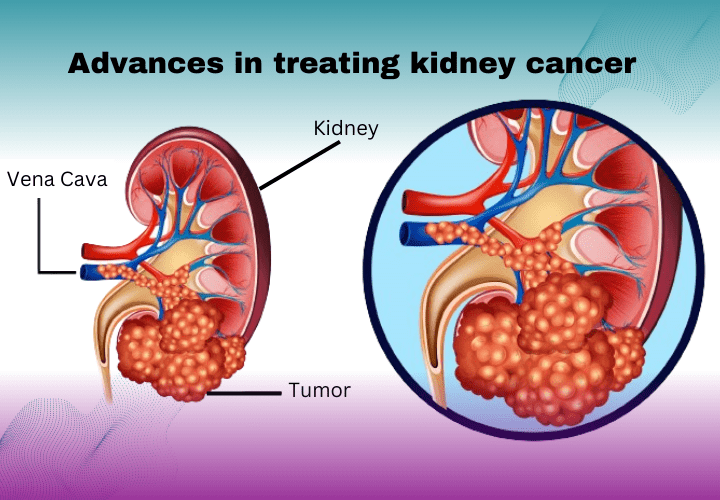Advances in treating kidney cancer

Advances in treating kidney cancer
- onco
- June 18, 2024
Kidney cancer is one of the most common cancers globally and has seen remarkable advancements in its treatment over the past few decades. From traditional surgical methods to cutting-edge immunotherapies and targeted treatments, the landscape of kidney cancer therapy has evolved significantly, bringing new hope to patients and healthcare providers alike. In this comprehensive guide, let’s delve into the latest advances in Kidney cancer treatment, highlighting the impact of these innovations on patient outcomes and the future of cancer care.
Let’s know about Kidney Cancer:
As we are all aware, kidney cancer develops in the kidneys, which are two bean-shaped organs located behind the abdominal organs. The most common type of this cancer is Renal Cell Carcinoma (RCC), accounting for about 90% of cases. Other types include transitional cell carcinoma, Wilms’ tumour, that is primarily affecting children and renal sarcoma. Early-stage kidney cancer often presents with few symptoms, making early detection challenging. As the disease progresses, symptoms may include blood in the urine, back pain, and weight loss.
Evolution of Kidney Cancer Treatment:
- Surgical Innovations:
For decades, surgery has been the cornerstone of kidney cancer treatment, especially for localized tumours. The primary surgical options include:
- a) Radical Nephrectomy: Removal of the entire kidney, often recommended for larger or more aggressive tumours.
- b) Partial Nephrectomy: This procedure removes the tumour and a small margin of healthy tissue, preserving the remainder of the kidney. It is increasingly preferred for smaller tumours to maintain kidney function.
Patient outcomes have improved dramatically due to recent advancements in surgical procedures. Laparoscopic and robotic-assisted surgeries have become more common, offering several benefits over traditional open surgery, such as smaller incisions, reduced blood loss, shorter hospital stays, and quicker recovery times.
- Targeted Therapies:
Targeted therapies have revolutionized the treatment of kidney cancer by focusing on specific molecules involved in tumour growth and progression. These therapies interfere with cancer cell proliferation and survival, providing a more precise approach than traditional chemotherapy. Critical targeted therapies include:
- a) Tyrosine Kinase Inhibitors (TKIs): Drugs like sunitinib, sorafenib, and pazopanib inhibit specific enzymes (tyrosine kinases) that promote cancer cell growth. TKIs have shown efficacy in treating advanced RCC and have become a standard treatment option.
- b) mTOR Inhibitors: Temsirolimus and everolimus inhibit the mammalian target of the rapamycin (mTOR) pathway, which is crucial for cancer cell growth and proliferation. These drugs are particularly effective in patients with poor prognosis.
The introduction of these targeted therapies has significantly extended survival rates and improved the quality of life for many kidney cancer patients. However, resistance to these drugs can develop, necessitating ongoing research and the development of new agents.
Read More: Understanding Targeted Therapies Revolutionising Lung Cancer Treatment
- Immunotherapy:
One of the most intriguing developments in cancer treatment is immunotherapy, which uses the body’s immune system to combat cancer cells. In recent years, several immunotherapeutic approaches have shown promise in treating kidney cancer:
- a) Checkpoint Inhibitors: Drugs like nivolumab (Opdivo) and pembrolizumab (Keytruda) block proteins that inhibit the immune system’s ability to attack cancer cells. These checkpoint inhibitors have demonstrated significant efficacy in treating advanced RCC, leading to durable responses and prolonged survival.
- b) Combination Therapies: Combining checkpoint inhibitors with other treatments, such as TKIs or other immunotherapies, has shown synergistic effects, enhancing the overall anti-cancer response. For example, the combination of nivolumab and ipilimumab (Yervoy), another checkpoint inhibitor, has become a standard treatment for certain patients with advanced RCC.
The success of immunotherapy in kidney cancer has sparked a wave of research aimed at identifying new immune targets and developing novel immunotherapeutic agents with the potential to improve patient outcomes further.
- Personalized Medicine:
Personalized medicine, or precision oncology, tailors treatment to the individual characteristics of each patient and their tumour. Advances in genomics and molecular profiling have enabled the identification of specific genetic mutations and molecular alterations in kidney cancer, guiding treatment decisions and leading to more effective and less toxic therapies.
For example, next-generation sequencing (NGS) can identify mutations in genes such as VHL, PBRM1, and BAP1, which are involved in the pathogenesis of RCC. Understanding these genetic alterations can help predict responses to targeted therapies and immunotherapies, allowing for more personalized treatment plans.
Read More: How Does Immunotherapy Help In The Fight Against Cancer?
- Minimally Invasive and Ablative Techniques:
In addition to surgical resection, minimally invasive and ablative techniques have emerged as viable options for treating small kidney tumours, particularly in patients who are not candidates for surgery. These techniques include:
- a) Cryoablation: Involves inserting a probe under the skin to freeze the tumour.
- b) Radiofrequency Ablation (RFA): Using high-energy radio waves to heat and destroy the tumour.
- c) High-Intensity Focused Ultrasound (HIFU): Using focused ultrasound waves to heat and ablate the tumour tissue.
These approaches offer several benefits, including preservation of kidney function, shorter recovery times, and possibly repeating the procedure if necessary. However, their long-term efficacy compared to traditional surgery is still being studied.
Challenges and Future Directions:
While significant progress has been made in treating kidney cancer, several challenges remain. Resistance to targeted therapies and immunotherapies is a considerable hurdle, highlighting the need for ongoing research to identify new therapeutic targets and develop more effective treatments.
Additionally, kidney cancer’s heterogeneity poses a challenge for personalized medicine. Tumours can vary significantly between patients and even within the same patient, necessitating a more nuanced approach to treatment. Advances in liquid biopsy technologies, which analyze cancer-related genetic material in blood samples, offer the potential for real-time monitoring of tumour evolution and treatment response, facilitating more dynamic and adaptive treatment strategies.
Integrating Artificial Intelligence (AI) and machine learning into cancer research holds promise for accelerating the discovery of new therapies and optimizing treatment plans. AI can analyze vast amounts of data from clinical trials, genomic studies, and patient records to identify patterns and predict treatment outcomes, potentially leading to more effective and personalized cancer care.
In overview, the treatment landscape for kidney cancer has transformed dramatically over the past few decades, driven by advances in surgical techniques, targeted therapies, immunotherapy, and personalized medicine. These innovations have improved many patients’ survival rates and quality of life, offering new hope in the fight against this challenging disease.
As research continues to uncover the underlying mechanisms of kidney cancer and develop more effective treatments, the future looks promising. Integrating new technologies and approaches, such as AI and liquid biopsies, will further enhance our ability to tailor treatments to individual patients and monitor their progress in real-time.
While challenges remain, the advances in treating kidney cancer represent a significant leap forward, bringing us closer to the ultimate goal of curing this disease. The continued collaboration between researchers, clinicians, and patients will be crucial in driving further progress and ensuring that the benefits of these innovations reach all those affected by kidney cancer. If you also want to treat your kidney or any other type of cancer, you should consult with Oncoplus, the best oncology hospital in Delhi. We are aware of the pains tolerated by cancer patients, so our compassionate staff and committed team work hard every day to ensure that our patients will have a positive experience. At Oncoplus, we sincerely think that a quick recovery can be significantly assisted by the environment.





Leave a Reply